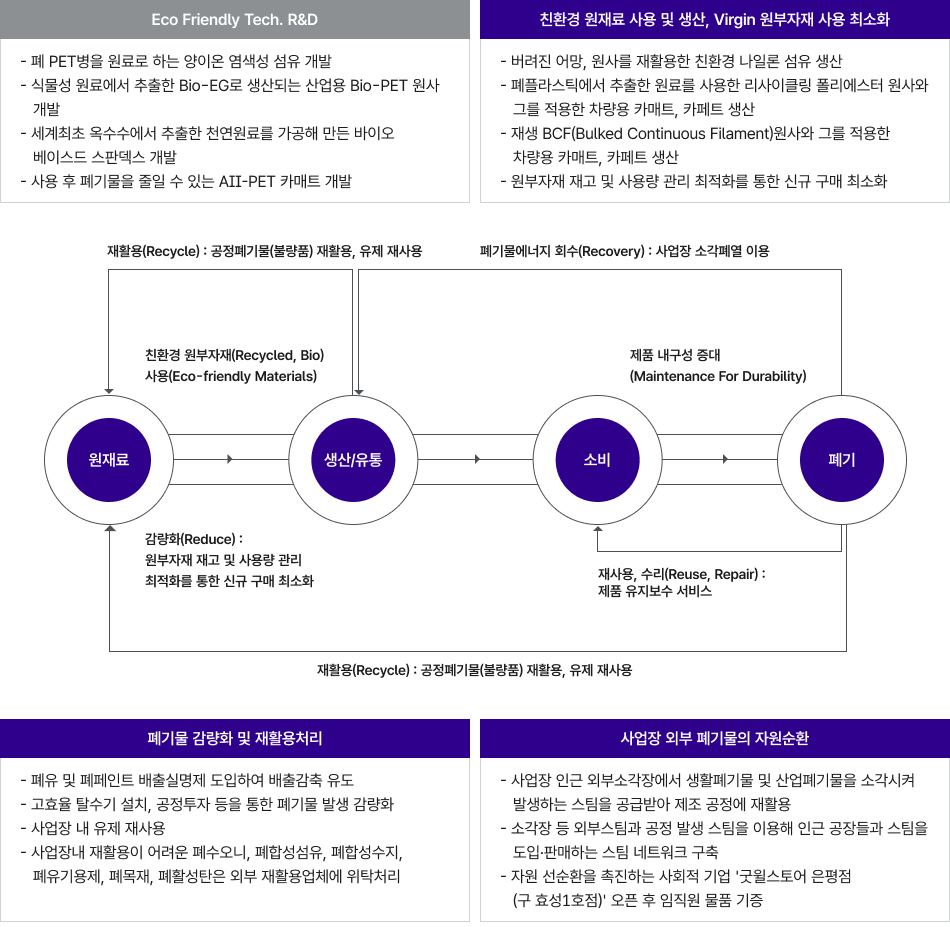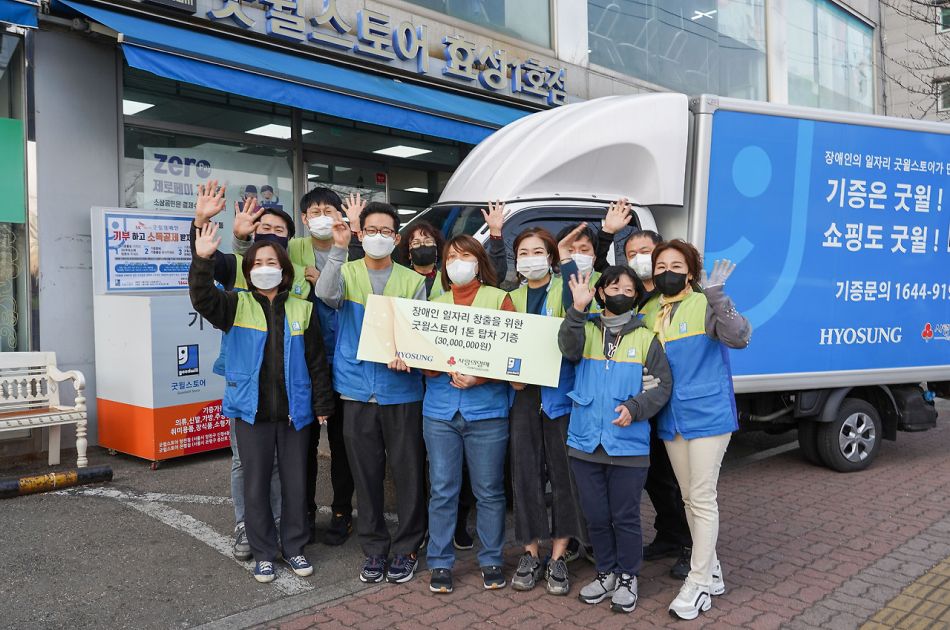Environmental
Pollution Reduction
Hyosung has established an environmental management system to minimize potential negative environmental impacts from plant operations. The company operates with internal control standards that are stricter than the legal emission limits. In addition, Hyosung has developed and is actively executing investment plans for environmental improvements to reduce pollutant and hazardous substance emissions, promoting the creation of environmentally friendly workplaces. To further protect biodiversity and prevent negative impacts on ecosystems from its business activities, Hyosung also implements a range of environmental conservation initiatives.
Environmental compliance principles
Link CopyHyosung adheres to the principles to minimize pollution and environmental impacts and effectively manage environmental risks by adhering to environmental laws and regulations.
-
1.
In accordance with environmental management policies, manuals, and procedures, we shall immediately reflect any amendments to environmental laws and regulations, carefully review environmental laws to manage environmental risks efficiently, and assess compliance annually.
-
2.
We shall make efforts to reduce our environmental impact by establishing internal standards that are more stringent than legal requirements.
-
3.
We shall transparently disclose our compliance with environmental laws and regulations to stakeholders through various channels, such as sustainability reports, the Env-Info System, and the CDP.
Environmental Control System
Link CopyEvery year, Hyosung sets KPIs and objectives for environmental management items*, develops annual plans, and evaluates whether or not these objectives are met.
e.g. environmental qualification management, environmental impact assessment, environmental compliance assessment, regulation management, air and water pollutant concentrations, waste generation, responding to stakeholder complaints-
Water quality
Hyosung Anyang Plant undergoes water quality analysis four times a month for general water pollutants and quarterly for specific hazardous substances through an external agency.
The plant also sets its own management standards, which are stricter than legal requirements,
with water pollutant discharge limited to within 30% of the legal limit. -
Air quality
Hyosung Anyang Plant has set its own management standards at 20% of the legal emission allowance for air pollutants such as NO_x and SO_x.
The plant conducts continuous monitoring, and in case of an excess, it undergoes immediate improvement measures, such as equipment replacement.
Also, the installation of low- NO_x burners helps minimize air pollutant emissions.
In addition, the Anyang Plant rules out the use of substances containing chlorofluorocarbons, which are governed by the Montreal Protocol, an international treaty designed to protect the ozone layer.
-
Waste
Hyosung Corporation adheres to procedures set forth in relevant laws and regulations to ensure that waste generated from our business sites is treated and tracked legally.
Hyosung Anyang Plant processes defective chips and yarns into a form that can be sold to recyclers instead of disposing of them, thereby contributing to reducing waste that would otherwise be incinerated or sent to landfills.
-
Chemical substances
Hyosung Corporation verifies whether all materials contain chemical substances through its internal ERP system. For materials classified as chemical substances, the company obtains relevant chemical information—such as MSDS and LOC—from suppliers via its electronic procurement system. These details are then reviewed within the company’s chemical substance management system (ECMS) to determine whether the material is subject to regulatory controls. Only materials that pass this review and receive approval are eligible for purchase.
In addition, Hyosung Corporation strictly monitors and complies with Chemicals Control Act (CCA) and the Act on the Registration and Evaluation of Chemicals (AREC), ensuring systematic data management. The company transparently submits and discloses chemical usage reports, emission surveys, and statistical data to the Ministry of Environment.
Furthermore, beyond mandatory legal training for site managers, Hyosung provides annual internal chemical substance training programs at the group level.
Hyosung Anyang Plant does not use any hazardous chemical substances.
-
Soil
Hyosung Anyang Plant has no facilities that cause soil pollution.
-
Zero-emission vehicles(ZEVs)
Hyosung Corporation operates ZEVs, including electric vehicles, that can reduce air pollution and Greenhouse gas emissions. We plan to increase the proportion of ZEVs to total vehicles over time.
Closed loop Recylcing
Link CopyHyosung employs a company-wide approach to closed-loop recycling as part of our efforts to preserve the earth's resources for coming generations.
We strive to use resources efficiently and minimize waste generation throughout the entire product lifecycle—from raw material procurement and production to distribution and disposal.
To this end, the company establishes and implements policies at each stage of the process, contributing to the development of a sustainable circular economy.


- Environmentally Friendly Technologies, R&D
- Developing cation dyeable (CD) PET yarn using waste PET bottles as raw materials Developing an industrial Bio-PET yarn that is produced using Bio-EG, a material extracted from plants Developing the world’s first bio-based spandex yarn made of substances extracted from natural raw materials such as corn Developing recyclable automotive car mats
- Use and Production of Environmentally Friendly Raw materials, Virgin Material Reduction
- Developing a technology to recycle waste fishing nets into nylon fabrics Producing recycled polyester yarn using extracted raw materials from plastic waste to apply in fabrics, car mats, and carpets Developing car mats and carpets using recycled Bulked Continuous Filament (BCF) Minimizing new purchases through optimized raw material inventory management
- Raw Materials
- Production/Distribution
- Consumption
- Disposal
- Reducing and Recycling Waste
- Introducing a real-name waste discharge system for waste oil and paint, facilitating waste discharge reductions Installing a high-efficiency dehydrator and investing in the advancement of manufacturing processes to minimize wastewater sludge Reuse of emulsion Recycling all wastewater sludge, synthetic fibers, organic solvents, wood, activated carbon by entrusting them to a waste treatment company
- Resource Circulation of Waste Materials Outside Business Sites
- Recycling steam generated by incinerating waste from external incinerators in the manufacturing process Establishing a network to trade external steam and steam generated during process among nearby plants Opening 'the Goodwill Store Eup-Pyeong Branch(Former Hyosung Branch 1),’ a social enterprise promoting resource circulation, where our employees donated items.
Purchasing Environmentally Friendly Products
In consideration of resource conservation, Hyosung adheres to the Green Procurement Policy and continues to engage in environmentally friendly procurement.
At the Hyosung Anyang Plant, the company consistently practices environmentally-friendly purchasing, including the procurement of NY recycled chips, bio-PET, LEDs, and fire extinguishers.
- Sustainable Procurement Policy
-
Hyosung Corporation strives to faithfully fulfill its environmental and social responsibilities, and observes the following procurement principles to minimize negative impacts from business activities.
-
1.
We choose suppliers who are able and willing to prevent negative environmental impacts, such as water pollution, soil pollution, and air pollution, and to respond to climate change.
-
2.
We choose suppliers whose social responsibilities include working conditions that adhere to the International Labor Organization's labor standards, protection of diversity, protection of human rights, and ethics management.
-
3.
We choose suppliers who prioritize the safety of both users and company employees.
-
- Green Procurement Policy
-
Hyosung Corporation adheres to the following principles in order to fulfill its responsibilities to product users and society through green procurement activities that contribute to resource conservation and environmental impact reduction.
-
1.
To conserve resources, we refrain from making unnecessary purchases so that there are as few remaining quantities as possible.
-
2.
In addition to quality and price, we evaluate the environmental properties of products and give environmentally friendly products preference.
-
3.
To expand green procurement, we continually seek out products that use fewer hazardous chemicals, generate less waste, and reduce resource consumption.
-
4.
We share our green procurement policy with our partners and encourage activities to improve the eco-friendliness of products supplied.
-
Reduction of Materials and Water Use
Hyosung reduces the amount of new purchases by optimizing the inventory and usage management of raw and auxiliary materials. We conserve water by minimizing unnecessary water use in the production process. Each year, we set water consumption targets for each water source, such as municipal water and industrial water, and work to reduce the amount relative to targets.
Production Using Recycled Yarns and Fabrics
Hyosung has obtained Global Recycled Standard (GRS) certification for its NY films and PETs made from recycled yarns and fabrics. GRS is a certification that verifies the utilization of recycled materials in textile raw materials and apparel production. Utilizing recycled raw materials, we participate in international efforts to reduce resource consumption.
Circular Products & Technology Development
Hyosung promotes environmentally friendly product innovation that transforms disposable waste, a major source of pollution, into green products.
We also develop products made with bio-based materials and technology for resource recycling.
We will stay committed to making unstinting R&D investments in environmentally friendly products and technology to be on the frontline of responding to climate change and building the environmentally friendly business ecosystem.
Resource Circulation through Waste Recycling
Hyosung processes defective chips and yarns into a form that can be sold to recyclers instead of disposing of them, thereby contributing to waste reduction and resource conservation.
Employee Donation of Goods to Goodwill Store

Goodwill Store is a social welfare organization that uses the proceeds from the sale of donated goods to create jobs and provide vocational education and training for people with disabilities and vulnerable communities, thereby promoting sustainable resource circulation.
In October 2013, Hyosung opened the first Hyosung Goodwill Store in Eunpyeong-gu, Seoul, a first for a Korean company, and Goodwill Store donation boxes are installed at the Hyosung headquarters and each business site to forward employee donations to the Hyosung Goodwill Store.
Development of pollution reduction technology
Link CopyDevelopment of environmentally friendly catalyst processing technology to replace harmful heavy metals
Hyosung successfully developed the world's first environmentally friendly polyester catalyst called "antimony-free” and received recognition for its patented technology. We were also awarded the King Sejong Prize by the Korean Intellectual Property Office.
"Antimony-free” is an environmentally friendly catalyst that replaces antimony, which is used to produce polyester products. Antimony is one of the eight heavy metals. Even though many leading companies in and outside of Korea had tried to develop an alternative for antimony, they failed in commercialization. Using tin (Sn) instead of heavy metals, our antimony-free catalyst is safe for the human body and the earth. We completed the development in 2020 and succeeded in mass production using the catalyst, just three years after initiating the project in 2017.
The antimony-free catalyst reduces the input of catalysts by one-tenth compared to previous ones, leading to a significant reduction in plastic waste generated during the production of polyester products. In addition, the catalyst improves the production process and enhances the quality of the final products.
We have established a phased plan to apply this catalyst in polyester fiber production processes and intend to progressively expand its use. Furthermore, to increase its applicability in the global market, patent registrations are being pursued in the United States, China, Europe, and India.
